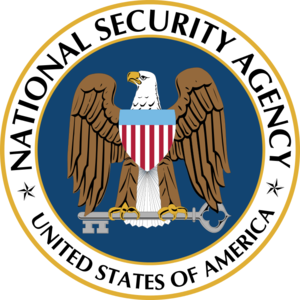Difference between revisions of "Director of the National Security Agency"
(deputy) |
|||
| Line 1: | Line 1: | ||
{{employment | {{employment | ||
|wikipedia=https://en.wikipedia.org/wiki/Director_of_the_National_Security_Agency | |wikipedia=https://en.wikipedia.org/wiki/Director_of_the_National_Security_Agency | ||
| − | |start=1952 | + | |start=November 4, 1952 |
|website=http://www.nsa.gov/about/leadership/index.shtml | |website=http://www.nsa.gov/about/leadership/index.shtml | ||
|deputies=Deputy Director of The National Security Agency | |deputies=Deputy Director of The National Security Agency | ||
Revision as of 12:41, 7 February 2016
 | |
| Start | November 4, 1952 |
| Leader of | National Security Agency |
| Deputy | Deputy Director of The National Security Agency |
| Website | http://www.nsa.gov/about/leadership/index.shtml |
| Leader of the National Security Agency. Boss of the Deputy Director of The National Security Agency. | |
Contents
Official narrative
The National Security Agency promises on its website to "protect national security interests by adhering to the highest standards of behavior"[1], so naturally its leader exemplifies such behavior.
Problems
After James Clapper infamously lied to the US Congress about mass surveillance, not only has the US Justice Department showed no interest in prosecuting him, but the commercially-controlled media has declined to make the obvious suggestion that a prosecution, or at the very least an investigation is in order.
Powers
Since 1964 the director of the NSA has had the power to fire any NSA employee at will without providing an explanation - leading the Washington Post to write: "This is the very definition of arbitrariness. It means that an employee could be discharged and disgraced on the basis of anonymous allegations without the slightest opportunity to defend himself."[2] Of course, 50 years later, in the age of persecution of whistleblowers - in which the US government admits to assassination and indefinite detention it means even more than that.
Deep State Control
The significance of the National Security Agency and its technical superiority to other intelligence agencies in key fields such as mass surveillance and cyberterrorism, together with its close support of other deep state-controlled groups leave little room for doubt that the Director of the National Security Agency is under firm control by the deep state.
Office Holders on Wikispooks
| Name | From | To | Description |
|---|---|---|---|
| Paul Nakasone | 4 May 2018 | ||
| Michael Rogers | 3 April 2014 | 4 May 2018 | |
| Keith B. Alexander | 1 August 2005 | 28 March 2014 | An infamously mendacious tenure |
| William B. Black | May 2005 | 31 July 2005 | Acting |
| Michael Hayden | March 1999 | May 2005 | |
| John Michael McConnell | May 1992 | February 1996 | |
| William O. Studeman | August 1988 | May 1992 | |
| William Odom | 1985 | August 1988 | |
| Lincoln D. Faurer | 1981 | 1985 | |
| Bobby Ray Inman | July 1977 | April 1981 | |
| Lew Allen | August 1973 | July 1977 | |
| Samuel C. Phillips | August 1972 | August 1973 | |
| Noel Gayler | August 1969 | August 1972 | |
| Marshall Carter | June 1965 | August 1969 | |
| Gordon Blake | January 1962 | June 1965 | |
| Laurence H. Frost | November 1960 | January 1962 | |
| John A. Samford | November 1956 | November 1960 | |
| Ralph J. Canine | 4 November 1952 | November 1956 |
References
- ↑ http://www.nsa.gov/about/values/index.shtml
- ↑ David Kahn, The Codebreakers, Scribner Press, 1967, chapter 19, pp. 672–733.